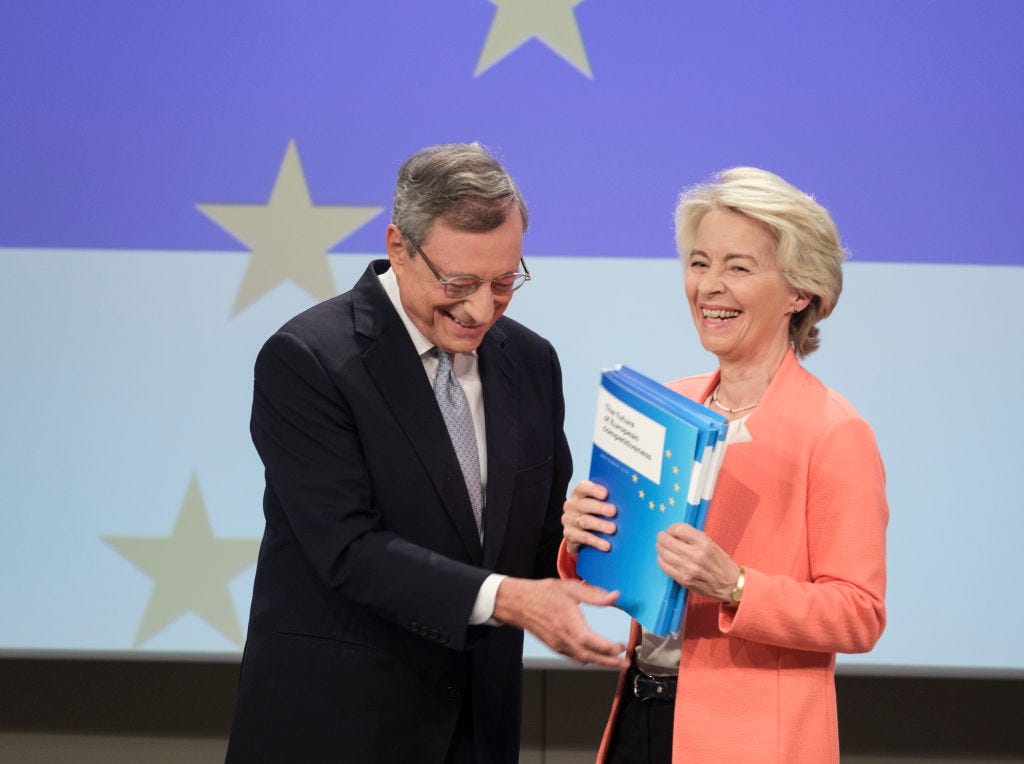Judgement Day
Physics will be the undoing of the European Union, and soon.
“We should never forget that competitive sustainability has always been at the heart of our social market economy.” – Ursula von der Leyen
As far as word salads are concerned, President of the European Commission Ursula von der Leyen is a culinary savant. The skill required to effortlessly blend oxymoronic phrases like “competitive sustainability” and “social market economy” in a manner that sounds like they should mean something is considerable. Yet von der Leyen pulls off such linguistic leaps into nothingness with admirable regularity. We all have to be good at something.
One thing the European Union (EU) has not been good at since the turn of the century is generating meaningful economic growth, especially in comparison to the US and China. Saddled with worsening demographics, multiple layers of intrusive government, and a bungled energy policy, the EU’s economic malaise has reached a crisis point. In a particularly pointed article published in The Wall Street Journal in July of 2023, “Europeans are Becoming Poorer,” the raw numbers were laid bare:
“The eurozone economy grew about 6% over the past 15 years, measured in dollars, compared with 82% for the U.S., according to International Monetary Fund data. That has left the average EU country poorer per head than every US state except Idaho and Mississippi, according to a report this month by the European Centre for International Political Economy, a Brussels-based independent think tank. If the current trend continues, by 2035 the gap between economic output per capita in the US and EU will be as large as that between Japan and Ecuador today, the report said.”
Like all good leaders of sprawling bureaucracies in the face of a festering challenge, von der Leyen decreed that a white paper should be written. For a task as important as this, she appointed the former chair of the European Central Bank (ECB) and all-around fixer Mario Draghi to lead the effort, giving him a full year to complete the assignment. Upon announcing the initiative and Draghi’s new role, she kept the banality machine humming:
“The European Union must do ‘whatever it takes’ to keep its competitive edge as it pushes industry for a green transition, has recruited Italy’s Mario Draghi to help map out the bloc’s strategy, the head of the EU’s executive arm said.
‘It is time to make business easier in Europe,’ Ursula von der Leyen, head of the European Commission, told the European Parliament plenary session in a speech Wednesday. ‘It’s an economic and national security imperative to preserve a European edge on critical and emerging technologies.’”
A year has come and gone, and A-student Draghi dutifully delivered his homework on time. In prepared remarks accompanying its conveyance, he spoke in existential tones:
“My concern is not that we will suddenly find ourselves poor and subservient to others. We still have many strengths in Europe. It is that, over time, we will inexorably become less prosperous, less equal, less secure and, as a result, less free to choose our destiny.
The European Union exists to ensure that Europe’s fundamental values are always upheld: democracy, freedom, peace, equity and prosperity in a sustainable environment. If Europe cannot any longer deliver these values for its people, it will have lost its reason for being.
So, this report is not only about competitiveness – it is about our future and the common commitment that we need to reclaim it.”
In assessing the EU’s predicament, Draghi identified three issues requiring urgent attention. First, he correctly assessed that Europe is deeply lacking in entrepreneurial dynamism compared to its more nimble competitors. Second, the EU’s ambitious climate targets are placing the bloc at a substantial disadvantage, which he partially blames on a “lack of natural resources.” Finally, Draghi highlighted the region’s significant national security weaknesses and its risky dependencies on rivals, an especially acute issue in light of developing events in the war in Ukraine.
While elements of Draghi’s diagnosis seem credible enough, it is his proposed solutions that beg cross-examination. If implemented, they would all but certainly exacerbate Europe’s woes. Indeed, the fact that the EU’s most respected leaders are still unable to understand the basic physics of economic functioning is becoming rather alarming. The longer they pretend they can filibuster reality, the less likely the union itself survives this crisis of its own making. Let’s reframe the issues at work to properly examine the deep flaws in Draghi’s plan.



